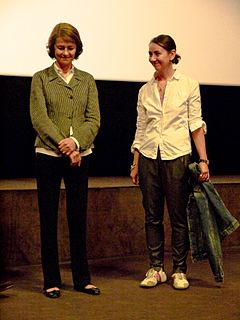A Quote by Angelina Maccarone
If you want to get to know somebody you don't ask other people: 'How is she?' You talk to the person herself. And then you don't ask about facts like 'date of birth' or 'profession of parents.' but you talk about essential questions and themes in life.
Related Quotes
Don’t ask me those questions! Don’t ask me what life means or how we know reality or why we have to suffer so much. Don’t talk about how nothing feels real, how everything is coated with gelatin and shining like oil in the sun. I don’t want to hear about the tiger in the corner or the Angel of Death or the phone calls from John the Baptist.
People are always asking, "Is this person in front of me the same on the inside as he or she appears to be on the outside? Is there congruence between what's within that person and the words and actions I'm viewing and hearing externally?" Children ask that about their parents; students ask it about their teachers; parishioners ask it about their pastors and priests; employees ask it about their bosses; and in a democracy, citizens ask it about their political leaders.
A lot of my books deal with very controversial issues that most people often don't want to talk about, issues that, in my country, are more likely to get put under the carpet than get discussed. And when you talk about moral conundrums, about shades of gray, what you're doing is asking the people who want the world to be black and white to realize instead that maybe it's all right if it isn't. I know you'll learn something picking up my books, but my goal as a writer is not to teach you but to make you ask more questions.
To get a person's real opinion, ask what she thinks everyone else believes... If people truly hold a particular belief, they are more likely to think that others agree or have had similar experiences. [People] tend to assume that other people have had life histories at least somewhat similar to their own. When we talk about other people, we are often talking about ourselves, whether we know it ourselves.
When you go to that other country you realize that in France and in England, you don't ask somebody what they do for a living when you meet someone. A lot of the obvious things, the shortcuts we take in America - in America you can talk about money all you want. You can ask how much they make, rent they pay, how much their house costs and how much their car costs, and they'll feel comfortable telling you. But it's scandalous to ask anyone in England or France a question like that.
When you talk about what you want and why you want it, there's usually less resistance within you than when you talk about what you want and how you're going to get it. When you pose questions you don't have answers for, like how, where, when, who, it sets up a contradictory vibration that slows everything down.
The part of the strangeness of coming back from the war is the way we talk about it. We try to have a discussion about the war that doesn't turn into a discussion about one political side or the other. I wanted to reach out and talk to people about it through fiction, the way a narrative can draw someone in and ask them those questions.
When I want to tackle a story or a subject, I always ask myself three questions: Is it important to talk about that? Will it interest other people than just me? Can I live with that for three or four years because that's how long it takes to do the project, to write the script, and to direct it, and then to do this.
I'm trying to be morally responsible and no more. I don't have an agenda I'm trying to push. People talk about Three Days of the Condor as being anti-government but the last statement in that movie is the CIA guy saying to Robert Redford, "Ask 'em when they're running out. Ask 'em when there's no heat in their homes and they're cold. Ask 'em when their engines stop. Ask 'em when people who have never known hunger start going hungry. You want to know something? They won't want us to ask 'em. They'll just want us to get it for 'em!"
When I talk about how we're going to pay for education, how we're going to invest in infrastructure, how we're going to get the cost of prescription drugs down, and a lot of the other issues that people talk to me about all the time, I've made it very clear we are going where the money is. We are going to ask the wealthy and corporations to pay their fair share.






































